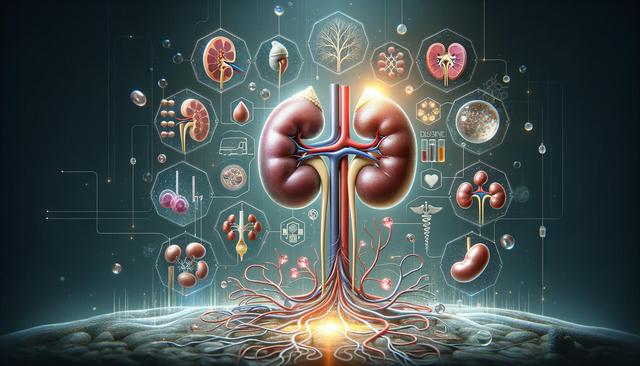What Is Kidney Disease?
Kidney disease, also known as renal disease, refers to the gradual loss of kidney function over time. The kidneys are essential organs that filter waste and excess fluids from the blood, which are then excreted in urine. When the kidneys are damaged, waste accumulates in the body, leading to a range of health issues. There are two main types of kidney disease: acute kidney injury, which occurs suddenly, and chronic kidney disease (CKD), which develops over a longer period. Common causes include diabetes, high blood pressure, and certain genetic conditions. Recognizing early symptoms—such as fatigue, swelling in the ankles or feet, and changes in urination—can lead to earlier diagnosis and more effective management.
Diagnosis and Monitoring
Diagnosing kidney disease typically involves a combination of blood and urine tests to evaluate how well the kidneys are functioning. Two key markers are the glomerular filtration rate (GFR) and the presence of protein in the urine. Imaging tests like ultrasounds or CT scans may also be used to detect structural abnormalities or blockages. Once diagnosed, regular monitoring is crucial to track the progression of the disease and assess the effectiveness of treatments. Patients are often advised to maintain a health diary and undergo periodic testing to ensure timely intervention if the condition worsens. Early detection and consistent monitoring can help slow disease progression and improve quality of life.
Non-Dialysis Treatment Approaches
In the early stages of kidney disease, treatment often focuses on managing the underlying causes and preventing further damage. This typically includes:
- Controlling blood pressure through medication and lifestyle changes
- Managing blood sugar levels in patients with diabetes
- Maintaining a kidney-friendly diet low in sodium, phosphorus, and protein
- Staying hydrated and avoiding substances harmful to the kidneys, such as certain over-the-counter pain relievers
In addition to medical treatment, lifestyle changes play a significant role in supporting kidney health. Regular exercise, smoking cessation, and limiting alcohol intake can have a positive impact. Nutritional counseling can also help patients make informed dietary choices that reduce the strain on their kidneys while ensuring they get essential nutrients.
Dialysis and Its Role
When kidney function drops to a critical level, dialysis may be necessary. Dialysis is a medical procedure that performs the kidneys’ functions artificially. There are two primary types:
- Hemodialysis: Blood is filtered through a machine outside the body
- Peritoneal dialysis: The lining of the abdomen filters the blood using a special fluid
Each method has its own benefits and considerations. Hemodialysis is often performed in a clinical setting, typically three times per week, while peritoneal dialysis can be done at home, offering more flexibility. The choice depends on the patient’s health status, lifestyle, and personal preferences. While dialysis is life-sustaining, it is not a cure for kidney disease and is usually considered a long-term solution or a bridge to transplantation.
Kidney Transplant and Future Outlook
For eligible patients with end-stage kidney disease, a kidney transplant can offer a more permanent solution. This involves surgically placing a healthy kidney from a donor into the patient’s body. Transplants can come from living donors or deceased donors. While the procedure carries risks, many recipients enjoy significantly improved quality of life post-transplant. After surgery, patients must take immunosuppressant medications to prevent rejection of the new organ. The success of a transplant depends on multiple factors, including donor compatibility and the recipient’s overall health.
Looking ahead, research in kidney disease treatment is advancing rapidly. Innovations in regenerative medicine, artificial kidneys, and personalized treatment plans are providing hope for more effective and less invasive options. Clinical trials and patient advocacy have also contributed to better understanding and management of kidney conditions.
Conclusion: Taking Control of Kidney Health
Kidney disease treatment encompasses a wide range of strategies tailored to the individual needs of the patient. From early lifestyle changes and medication to dialysis and transplantation, each stage of care aims to preserve kidney function and improve quality of life. Understanding the available options and working closely with healthcare providers empowers patients to make informed decisions about their care. Whether you’re managing a recent diagnosis or supporting a loved one, staying educated and proactive is key to navigating kidney disease effectively.

Leave a Reply